Follow Uncle Ho from the simplest things
(Baonghean) - At the age of 89, Mr. Nguyen The Vien (former reporter of Vietnam News Agency, currently residing in Ngoc Thanh hamlet, Hung Thanh commune, Yen Thanh district) still clearly remembers every detail of the 3 times he followed Uncle Ho to visit localities and the times he met him privately.
At the age of 89, Mr. Nguyen The Vien (former reporter of Vietnam News Agency, currently residing in Ngoc Thanh hamlet, Hung Thanh commune, Yen Thanh district) still remembers very clearly every detail of the 3 times he followed Uncle Ho to visit the localities and the times he met him privately. On the occasion of the anniversary of his birthday, Mr. Vien had the opportunity to share stories and precious memories that have followed him throughout his life.
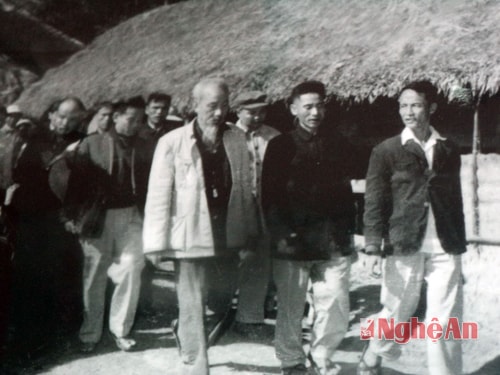 |
| President Ho Chi Minh visited Vinh Thanh commune - Yen Thanh on December 10, 1961. Photo: Archive |
Reporter:You were lucky enough to follow Uncle Ho to visit places like Co To Island, Hai Duong Province and Vinh Thanh Commune, Yen Thanh District, Nghe An Province. What was your deepest impression on these trips?
Mr. Nguyen The Vien:In February 1961, I was a reporter for the Vietnam News Agency stationed in Quang Ninh when I received a telegram from the General News Agency that Uncle Ho would visit Co To Island. This island is 200 km from Quang Ninh, and is considered a secret base where every time the revolutionary predecessors went abroad, they passed by here.
That time, Uncle Ho flew to the island. The island committee had set up a tent and built a large hall to welcome Uncle Ho. However, Uncle Ho did not go to the hall but went down to the fishing area of Pac Luan Cooperative to meet with the people and see how they were doing. Next, Uncle Ho went around to see the orange gardens on the island and the fresh water storage area. After that, Uncle Ho returned to the hall to meet and talk with the leaders on the island. Uncle Ho spoke to the people of Co To island in Chinese, I had to ask someone to translate for me. Uncle Ho thanked the people of Co To for protecting the revolution and he gave the people on the island a radio to listen to the news. The people were very touched when they received Uncle Ho's precious gift.
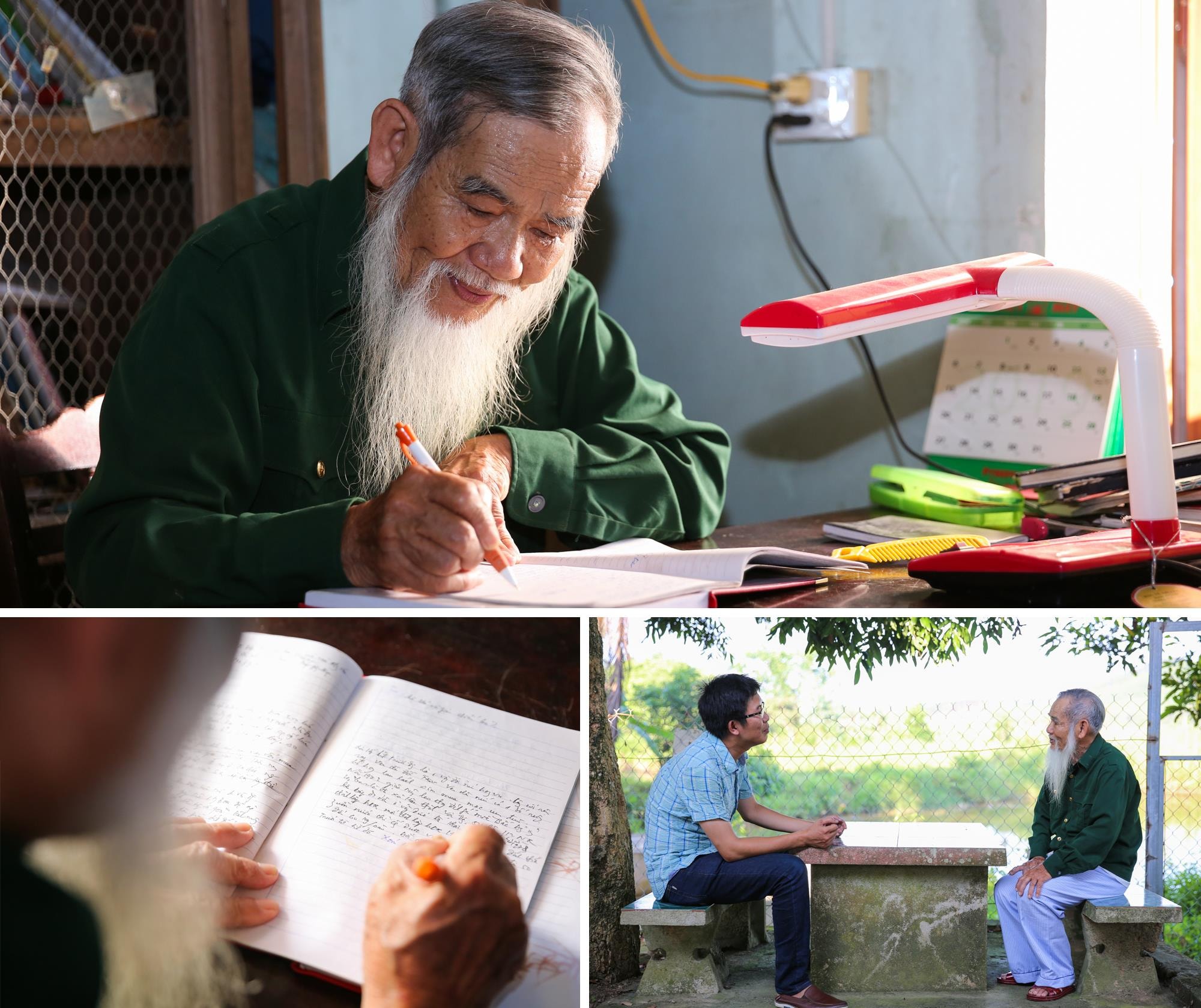 |
| Mr. Nguyen The Vien talked with reporters about his memories of meeting Uncle Ho. Photo: Duc Anh |
After working in Quang Ninh, I moved to Hai Duong province. In July 1962, Hai Duong province suffered a very heavy rain. The dikes of Ninh Giang district were all broken, and Hiep Luc commune was submerged in water. Uncle Ho called the Hai Duong Provincial Party Committee that he would come to visit. To welcome him, the Hai Duong Provincial Party Committee also held a very solemn ceremony, with the presence of many provincial officials. However, from Hanoi, Uncle Ho went straight to Ninh Giang. When he had already started pedaling water to fight flooding with the people, the Office of the Presidential Palace called the Hai Duong Provincial Party Committee that he had returned to Ninh Giang.
The leaders of Hai Duong Provincial Party Committee hurriedly ran to Ninh Giang. When they arrived, they saw Uncle Ho sweating profusely, his feet covered in mud, treading water with the people. When the provincial leaders arrived, Uncle Ho asked the Provincial Party Committee Secretary: "Uncle Chuong, are you going down to watch the performance or to fight the flood with the people, why are you dressed so neatly?". The Provincial Party Committee Secretary blushed with shame, quickly took off his shoes, and went down to pedal with Uncle Ho. Uncle Ho taught everyone: "Being a cadre does not mean always dressing neatly. When you need to be serious, be serious. When you go down to the people, you must be sociable." After visiting and encouraging the people of Ninh Giang to fight the flood, Uncle Ho taught: "You, the leaders of the people to fight the flood, need to fight the flood with the people"... Two days later, Ninh Giang successfully fought the flood.
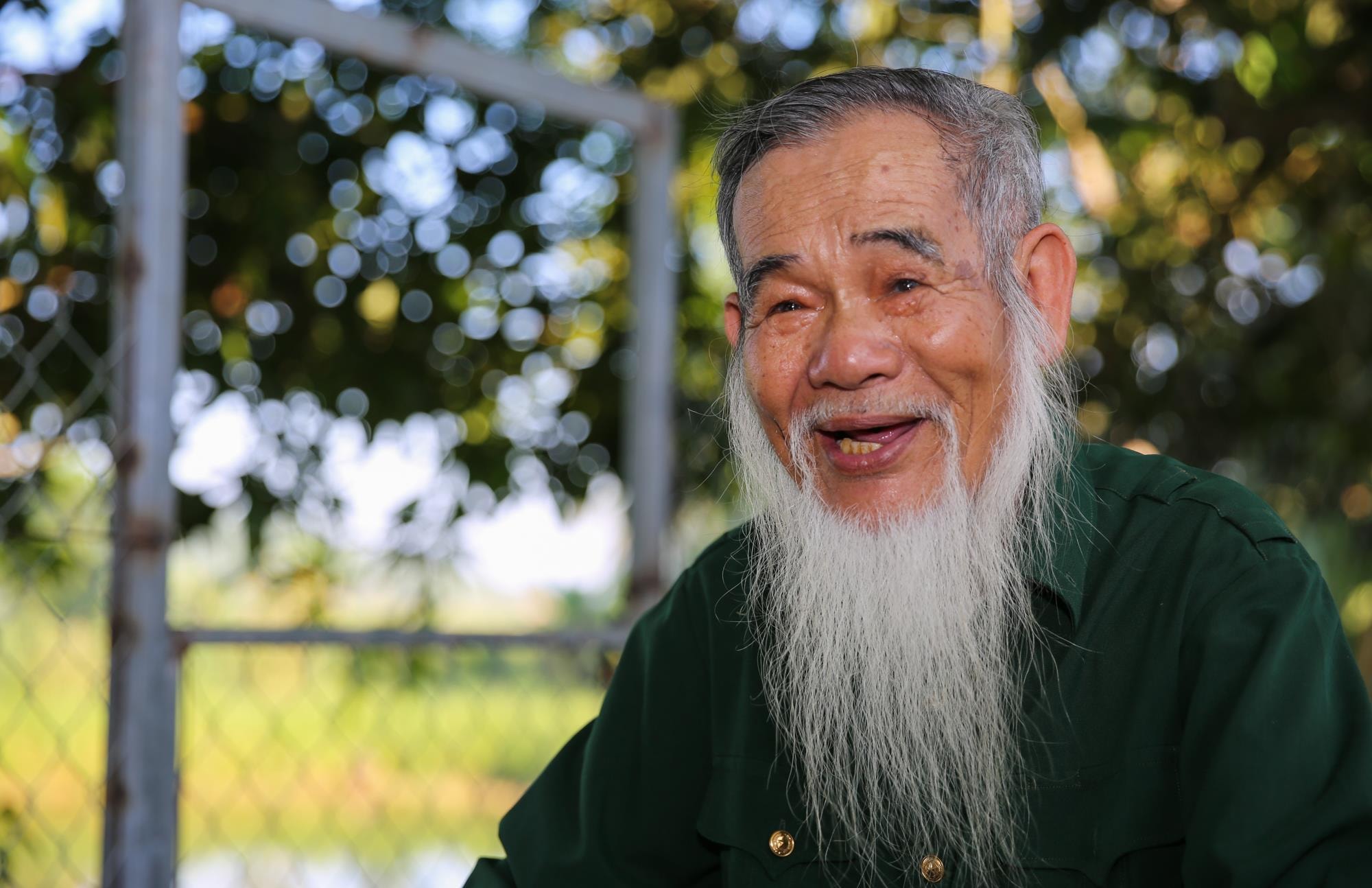 |
| Mr. Nguyen The Vien (former reporter of Vietnam News Agency, currently residing in Ngoc Thanh hamlet, Hung Thanh commune, Yen Thanh district). Photo: Duc Anh |
What I remember most is the time I visited Vinh Thanh commune, Yen Thanh with Uncle Ho in December 1961. When Uncle Ho's plane landed at the foot of Thap mountain, a large crowd of people came out to welcome him. Uncle Ho waved, asked questions, and thanked him. He did not go to the place arranged by the province, district, or commune, but went straight to the nursery. He visited the place where the children ate and lived.
While visiting the nursery, Uncle Ho saw a dilapidated, rickety thatched house on the opposite side. He turned to ask the Party Secretary of the commune, “Whose house is that?” The Secretary replied, “May’s mother’s house. May’s husband died, I don’t have one, I live alone.” Hearing that, Uncle Ho immediately went to visit May’s mother’s house. Then, turning around, he advised, “It’s good that you take care of wounded soldiers, sick soldiers, and martyrs’ families, but you must pay attention to the elderly and those who live alone. What must be done to improve people’s lives and make everyone happy?”
Uncle Ho passed by the Cooperative headquarters. He saw a very large swamp with overgrown grass. He asked the Commune Chairman: "Why can't we grow rice here?" The Commune Chairman replied: "Sir, the water here is too deep to grow rice." Uncle Ho taught: "If we can't grow rice, we can renovate it into a fish pond. If we renovate it well, we can both grow rice and build a fish pond, increasing the income of the cooperative and beautifying our homeland."
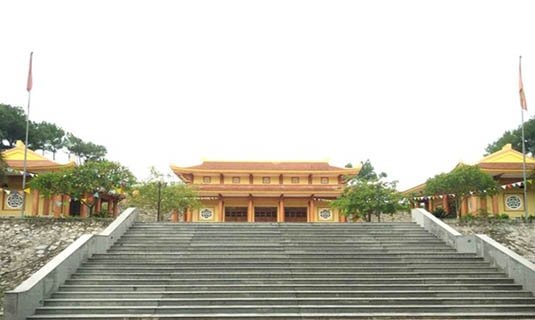 |
| Memorial house where Uncle Ho visited Vinh Thanh commune. Photo: Document |
After Uncle Ho's visit, Vinh Thanh commune launched an irrigation project and after 1 month, 10,000 cubic meters were dug and built, turning 11 hectares of wasteland into a beautiful fish pond. Every year, the cooperative releases fish fry at the end of the year to distribute to households. Those with little money get a few taels, those with a lot get a few kilos of fish to celebrate Tet. Later, Vinh Thanh people still call this Uncle Ho's fish pond. Remembering Uncle Ho's words, the people planted pine trees in Thap forest, covering 70 hectares of forest in the whole commune.
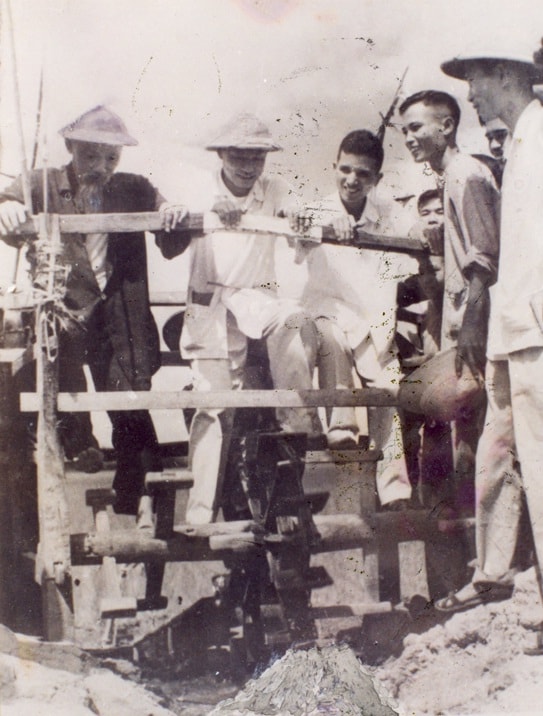 |
| Uncle Ho pedaling the water wheel in Hiep Luc commune (Ninh Giang - Hai Duong), July 26, 1962. Photo: Archive |
Reporter:In addition to these three visits, it is known that you also had private meetings with Uncle Ho? That is not only a lucky thing for a journalist, but also an endless honor and pride. What did you learn from him during those meetings?
Mr. Nguyen The Vien:After Uncle Ho visited Co To Island, I returned to Hanoi to write an article. After finishing writing, I sent the article to Comrade Vu Ky to submit for Uncle Ho's approval. That morning, I was in a hurry so I wore a bit of sloppy clothes to go to the Presidential Palace. As soon as I arrived, before I could meet Comrade Vu Ky, I saw Uncle Ho coming out. Uncle Ho asked: "Where are you going?". I replied: "Sir, I am a reporter from the News Agency writing an article for Comrade Vu Ky." Then Uncle Ho took my article and looked at it.
In that article, I quoted Uncle Ho's words (because Uncle Ho spoke in Chinese, I quoted him in Nghe An words). Uncle Ho smiled and taught: "You must not abuse the local language. Because journalism is for the whole country to read, not just for Nghe An people to read". Uncle Ho pointed to the sandals I was wearing and said in a serious voice: "Do you know where this is? You are wearing sandals without a back strap to the President's Palace? When going to a solemn and ceremonial place, journalists must dress properly, neatly, and seriously". At that time, I was very embarrassed. The next day, when I received my article back, Uncle Ho had edited a lot, especially the local words.
...The most touching moment was before the day of departure for B, our Central Journalists' group of 27 people were practicing mountain climbing in front of the Presidential Palace. When Uncle Ho saw us practicing, he praised us and advised us: If you are a journalist and can practice hard like that, you will avoid bloodshed. A journalist is a citizen, you must blend in with the people to be able to do journalism. When you go with the soldiers, you must be a soldier. Don't think that being a journalist is different, but you must get along and live simply with your brothers. Only then will your brothers express their thoughts and feelings, and you will have the emotions to write good articles. Uncle Ho's teachings are valuable lessons that have followed me throughout my working journey.
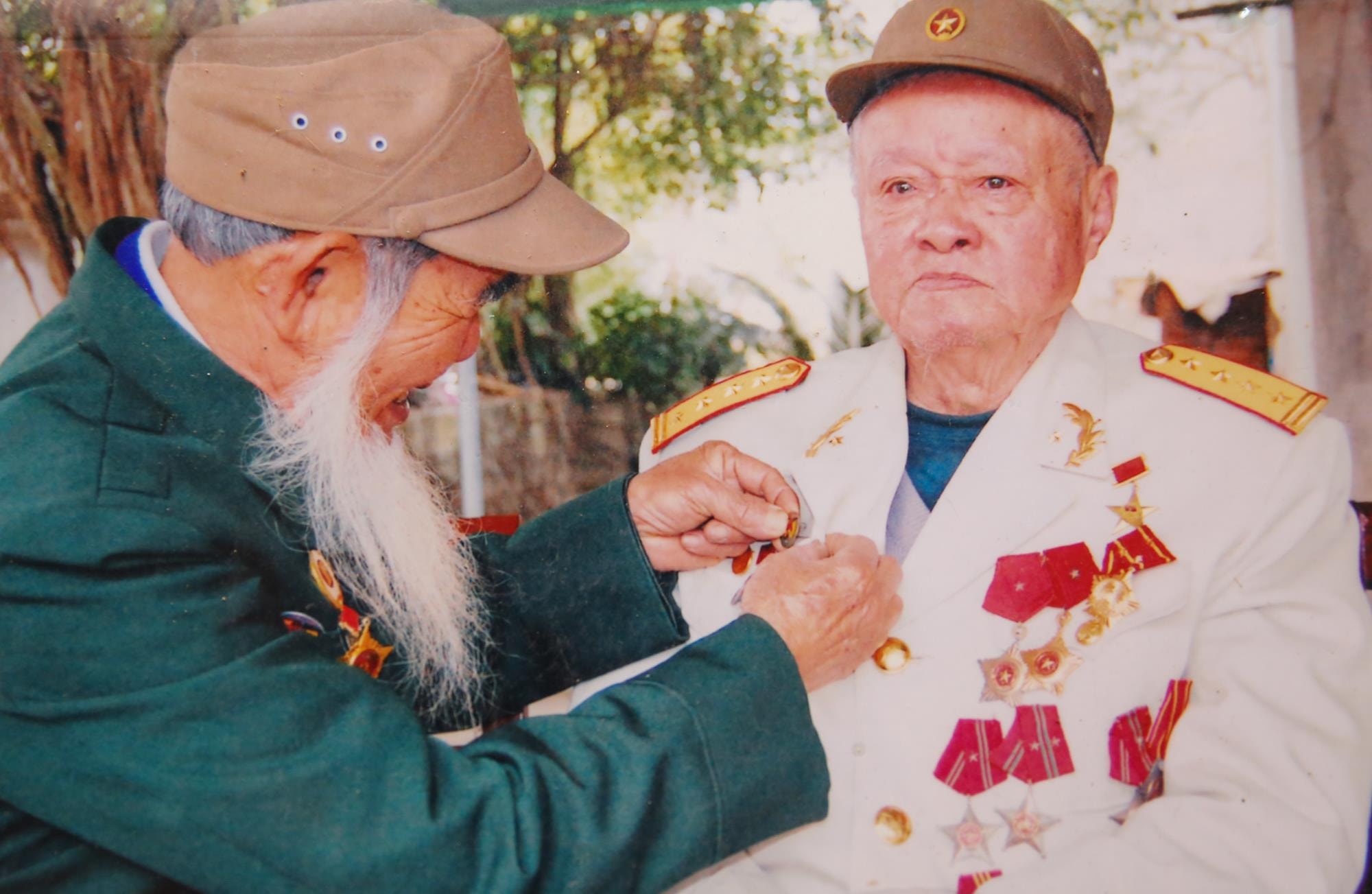 |
| Mr. Nguyen The Vien and People's Armed Forces hero Phan Tu. |
Reporter:In the current context, the entire Party, the entire army and the entire people are stepping up the implementation of Directive 05-CT/TW of the Politburo on promoting the study and following of Ho Chi Minh's ideology, morality and lifestyle. In your opinion, what should we do and how should we do it so that the study and following of Ho Chi Minh becomes more and more extensive? At the same time, so that his ideology, morality and lifestyle continue to be the guiding principle for all actions to further develop the country?
Mr. Nguyen The Vien:Our Uncle Ho once taught us: “As a cadre, you must take care of the people from soy sauce, tomato sauce, fish sauce, and salt.” Remembering his teachings, in recent years, our Party has actively rectified and eliminated opportunists, those who seek positions and power, and those who do not serve the interests of the people. The Party rectification has restored people’s faith in the Party and in Uncle Ho. This is to say that: In order for Uncle Ho’s ideology, morality, and style to shine even brighter, we need to actively rectify the Party.
To promote the implementation of Directive 05-CT/TW, we need to organize more activities to thoroughly understand and study Ho Chi Minh's ideology, morality and style; to replicate and spread good and effective ways of doing things, contributing to pushing back the bad and the not so good. In addition, we must promote following. Let's learn from Uncle Ho, follow Uncle Ho from the smallest and simplest things.
Reporter:Thank you!
